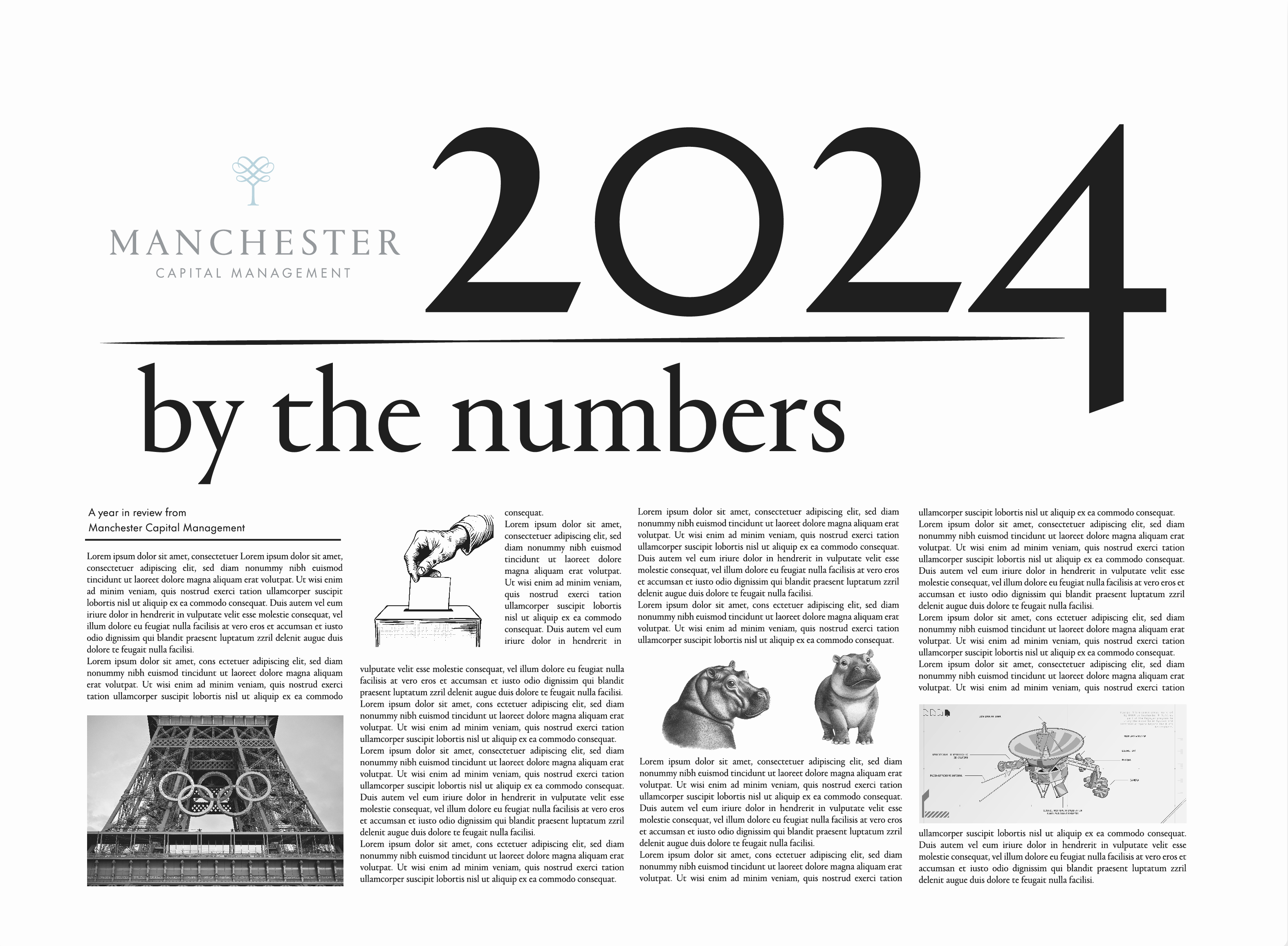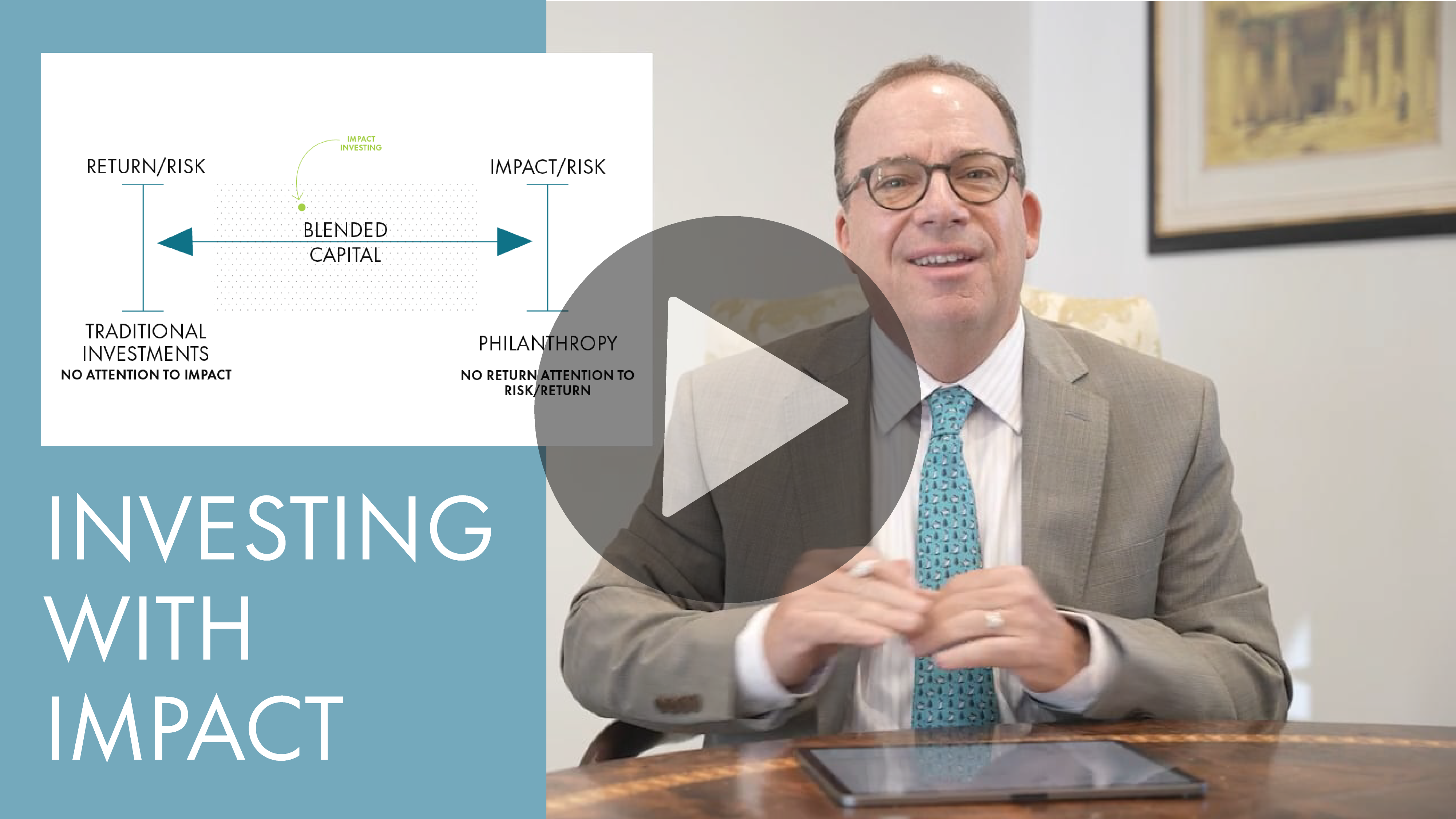
Information and education are an essential part of the client experience, and we
are here to provide resources and insights to help keep you advised.
It is once again that most joyous time of year where we step back to take time with our families, reflect on the accomplishments of the year that has passed and we, the authors, have the pleasure of writing another “By the Numbers” article. This year we saw the impact of tariffs, attempted and actual assassinations, hostage releases, space rescues, a Chicago Pope, airplane crashes, wildfires, wild swings in the market, a government shutdown, deportations, protests, and the ever-evolving world of artificial intelligence that made 2025 one for the books. Here are some numbers that help to tell that story: $18.81 Trillion – Dollars invested in ETFs globally. Assets have increased 26.7% year-to-date.1 $878 Billion – Dollar value of Elon Musk’s pay package at Tesla, approved by shareholders in November. In order for Musk to realize the full amount, Tesla market capitalization must rise in value from $1.5 trillion to...
12.30.2025
It is once again that most joyous time of year where we step back to take time with our families, reflect on the accomplishments of the year that has passed and we, the authors, have the pleasure of writing another “By the Numbers” article. This year we saw the impact of tariffs, attempted and actual assassinations, hostage releases, space rescues, a Chicago Pope, airplane crashes, wildfires, wild swings in the market, a government shutdown, deportations, protests, and the ever-evolving world of artificial intelligence that made 2025 one for the books. Here are some numbers that help to tell that story: $18.81 Trillion – Dollars invested in ETFs globally. Assets have increased 26.7% year-to-date.1 $878 Billion – Dollar value of Elon Musk’s pay package at Tesla, approved by shareholders in November. In order for Musk to realize the full amount, Tesla market capitalization must rise in value from $1.5 trillion to...

For ultra high-net-worth (“UHNW”) families, integrating health into wealth planning isn’t optional — it’s essential for legacy, performance, and peace of mind. The good news: Individuals today are living longer. Over the last 200 years, life expectancy in the US has doubled and now averages 78.8 years.1 The bad news: This tremendous gift also brings new responsibilities. With extended longevity comes the reality of rising healthcare needs, increasing complexity of care, and the need for thoughtful and prolonged preparation. Just as families plan deliberately for education, retirement, and estate transitions, strategic planning for health and care has become a critical pillar of generational resilience. For UHNW families, where stakes are high and expectations of quality and coordination are nonnegotiable, this planning is both a safeguard and a legacy strategy. The upcoming holiday season brings families together in ways that few other times of year do. Amid celebrations and meaningful traditions,...

Can you invest in a way which is environmentally and socially conscientious while still producing solid returns? ESG—shorthand for Environmental, Social, and Governance—was a modern response to that challenge. A framework, not a fixed destination, ESG aimed to bring a broader perspective to investment analysis, incorporating long-term systemic risks and opportunities alongside traditional financial metrics. But over the past few years, ESG moved from innovative insight to political football. Once one of the financial industry’s boldest growth areas, it has now become a flashpoint of both regulatory scrutiny and ideological debate. The story of ESG is not one of failure, but of evolution—a maturing concept being recalibrated for a more complex, more informed investment landscape. This article explores ESG’s path: how it rose so rapidly, why it faced backlash, and where thoughtful investors go from here. Most importantly, it outlines how ESG principles can still serve as powerful tools within...

At Manchester Capital Management, we have always believed that real estate can be an excellent long-term store of value —in today’s market, however, success increasingly depends on owning the right assets in the right places. The US commercial real estate landscape is in transition. Years of tightening monetary policy and price corrections have given way to a period of slow recovery, where discerning investors can find compelling opportunities in regions and property types supported by strong demographic and economic momentum. This is where we feel MCM excels — helping our clients cut through generalizations and find value where others may see only uncertainty. This month, we’re pleased to feature insights from Corbin Rich, Managing Director and Head of Real Estate, who offers a thoughtful update on the current state of commercial property markets and the key trends shaping future opportunities. “How is the market right now?” I often get this question about commercial real...

Today’s most dangerous cyber threats don’t come from hackers breaking into systems- they come from someone convincing you to open the door for them. When most people think of cybercriminals, it conjures up the notion of dimly lit rooms full of nefarious characters feverishly typing computer code, attempting to access your sensitive personal data. But in today’s cybersecurity landscape it’s almost always much simpler; the criminals ask for information directly, and many people unknowingly provide it. These scams, referred to as “social engineering schemes,” manipulate your trust, sense of urgency, or make you afraid. The perpetrators use these tactics to manipulate you into sending money, clicking a link, or handing over access. These attacks don’t require technical sophistication; they rely on something much more powerful, your willingness to act- quickly, emotionally, and often without verifying critical details. The Real Risk: It’s About What They’re Asking You to Do It doesn’t...

As investment stewards, we at Manchester Capital seek to preserve, protect, and grow client assets given the prevailing market, economic, and political climates. We do not take political positions, believing that doing so could unduly influence our financial decision making. Instead, we focus solely on our mission of helping clients achieve their financial objectives. It is through this lens that we review the market’s response to the first 100 days of the second Trump Administration—beginning January 17th, the final market close before inauguration, and ending 100 days later with the market’s close April 30th. While the first 100 days is an arbitrary metric, it is instructive in understanding the market’s attitude toward the administration’s actions. Market Performance and Volatility During this 100 day period, there have been 78 trading days for the market. Using the S&P 500 as a market proxy, the market closed January 17th at 5,996.66, peaked February...

The recent swoon in the market could be attributed to confusion and uncertainty around the United States’ new tariff and trade policy. The Trump administration has announced a flurry of current and potential future tariffs, that are changing and evolving almost daily, making it difficult for investors to adequately understand the goals, the economic impacts, and the potential unintended consequences. As such, the market has traded down on general uncertainty about our overall trade policy. Tariffs were a campaign promise to rectify certain inequities among our trading partners. As expected, shortly after the inauguration, the new administration announced tariffs on three of our largest trading partners. These tariffs were presented as a way to pressure Canada, Mexico, and China to assist with curtailing our immigration and fentanyl problems. Some tariffs were imposed, some changed, some delayed, and some are still being negotiated. The lack of clarity has caused confusion as...

If you have seen your property and casualty insurance premiums rise significantly over the past several years, you are not alone. Across the United States, coverage for homes, autos and valuable collections have increased at a double-digit pace. Unfortunately, few families can expect any moderation in the coming year, particularly those in higher risk “Cat-rated” areas. Affluent homeowners in Florida, California and several other states can expect to see premium increases of at least 20% and may also have to accept more restrictive coverage terms. Others may even have difficulty securing coverage at any price.1 Against that backdrop, here are some answers to questions you may have about the cost and availability of coverage to protect your family, your home and your possessions. Presented here is an article by HUB International, republished by permission. Consult your insurance professional to discover why it’s happening, what to expect and how to minimize...

At Manchester Capital Management, we view wealth as more than a measure of current financial health — it’s also a foundation for building enduring legacies. This month, we’re pleased to feature an article tailored for the next generation of wealth stewards, written by one of our talented Gen Z team members, Portfolio Analyst Miroslava Martinez. This article explores the fundamentals of compounding interest, one of the most powerful principles of long-term financial growth. It’s crafted to inspire younger family members to think longer term and to foster meaningful conversations among families about how small, consistent actions taken today can lead to extraordinary outcomes tomorrow. To understand compounding interest, it may be helpful to imagine hypothetical scenarios with two friends, Olivia and Liam. In these scenarios, Olivia began saving $50 a month at age 20, while Liam began saving $100 a month at age 30. When they’re both 60, who do...

A presidential election, summer Olympics, two regional wars, and a stock market reaching all-time highs all contributed to a year we will not soon forget. Here are some other notable statistics from 2024 as defined by their numbers. $ 36.2 Trillion – The national debt as of 12/4. That represents $ 107 Thousand per U.S. citizen or 123% of US GDP.1 $ 7.1 Trillion – Current annual U.S. Federal spending.2 $ 2.1 Trillion – Current U.S. Federal Deficit.3 $ 2.0 Trillion – The amount a proposed advisory committee of the incoming presidentialadministration believes the Federal Budget can be reduced.4 $ 1.0 Trillion – Current yearly interest on the national debt.5 $ 56 Billion – Elon Musk’s twice judicially-denied pay package at Tesla.6 50 Billion – The number of internet users worldwide as of October 2024 which amounted to 67.5 percent of the global population. Of this total, 5.2 billion, or 63.8...

The election is over, and it was a sweep by the republicans. For many, this seems to mean lower taxes, including the continuation of beneficial estate tax laws. There has even been a discussion of estate tax repeal. However, if history tells us anything, tax laws and campaign promises often do not entirely reconcile. So, what will happen is anyone’s guess, even for those with educated guesses. However, what is not a guess is the estate planning opportunities that exist now. The current estate tax laws, which were enacted during the first Trump administration, provide opportunities for high-net-worth families to pass significant assets gift and estate tax-free. Currently, the lifetime exemption from gift and estate tax is $13,610,000 per taxpayer. In 2025 the exemption is scheduled to increase by another $380,000. Then, at the end of 2025, the exemption is set to sunset and will revert to 2017 levels, which...

In this MCM Video Insight, Phil Kirshman, Director of Impact Investing at Manchester Capital Management, introduces impact as a third variable in the risk and reward equation. He discusses the definition of impact investing, the different ways it is approached, and how it can be integrated into an investor’s portfolio including some current opportunities. Disclosures This material is solely for informational purposes and shall not constitute a recommendation or offer to sell or a solicitation to buy securities. The opinions expressed herein represent the current, good faith views of the speaker at the time of publication and are provided for limited purposes, are not definitive investment advice, and should not be relied on as such. The information presented herein has been developed internally and/or obtained from sources believed to be reliable; however, neither the speaker(s) nor Manchester Capital Management guarantee the accuracy, adequacy or completeness of such information. Predictions, opinions,...